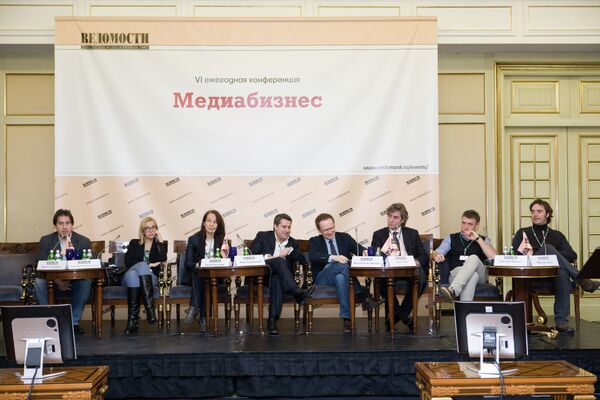Blogging has become a national hobby in Russia, with Russians among the most enthusiastic users of social networking sites and other new Web 2.0 media.
President Dmitry Medvedev is just one of 642,681 active Twitter users in Russia. The number of bloggers in the Russian LiveJournal segment has exceeded two million, making Russia the second “LiveJournal-addict” country after the United States with its five million bloggers.
With pressure on media to always be the first with news, many wonder whether the rise of blogging is a threat to traditional journalism.
This question was debated by Russian media bosses at a Vedomosti business daily's annual conference on media business in Moscow on Thursday.
News agencies inevitably lose the battle with bloggers in breaking news first, said Farit Khusnoyarov, development director of Medialogia, which produces and sells online media monitoring to press services of companies, including the Presidential Executive Office.
“Twitter overtook the information agencies while covering the Domodedovo blast,” Khusnoyarov said, referring to the terrorist attack at Moscow’s largest airport on January 24 when 36 people were killed and dozens were injured.
The two leading Russian news agencies, Interfax and RIA Novosti, were delivering the news with almost an hour delay, he said.
The first online reaction to the attack came from a blogger nicknamed laddove, who reported about the attack just five minutes after the initial blast, at 4:37 p.m.
RIA Novosti reported the incident at 4:47, but did not describe it as a terrorist attack, as the origins of the explosion were still unclear.
RIA journalists near the scene of the attack reported “fumes” filling the arrival zone, but “had not rushed to describe it as a terrorist attack as the bloggers did,” RIA Novosti Deputy Editor-in-Chief Valery Levchenko said.
Similarly, Interfax reported at 4:57 p.m. that a “loud bang” had been heard in the airport’s arrival zone.
“In the first Twitter messages people asked where RIA and Interfax were. People were waiting for information to be structured and checked,” said Yury Pogorely, the head of the economics service at Interfax.
Speed versus accuracy is an eternal dilemma for journalists, and citizen journalism together with digital technology has only made it worse. Videos and photos posted online tend to be trusted because “the camera never lies,” although images can be just as misleading as text is if it is misinterpreted.
One factor boosting the media news race is the need to hit top positions in search lists like Google. Being first and grabbing audience traffic is what makes the media attractive for advertisers.
Many media experts think a few minutes’ delay in waiting for an accurate story means little to the average reader. Readers still demand more reliable and in-depth content than a simple blog.
Vedomosti website’s Digital Publisher, Viktor Saxon, said the influence of bloggers on the media market was over-exaggerated. “Bloomberg and Reuters monitor the stock market and no Twitter post can trigger a collapse in a company’s stocks.”
“It is a great myth that in the future there will be no need for journalists since people will write everything themselves,” said Vladimir Sungorkin, editor-in-chief of the popular Russian tabloid Komsomolskaya Pravda. “They will not write worth a damn.”
“People are irresponsible, they tend toward wishful thinking…we will not receive any clear information about what happened from ordinary people,” Sungorkin added.
Media experts, like any ordinary journalists, love to argue, make forecasts and calculate profitability, but as long as the number one Russian blogger is the Russian president, citizen journalism will flourish. Many news agencies have already hired dedicated staff to monitor the blogosphere.
MOSCOW, March 5 (RIA Novosti, Anastasia Markitan)

